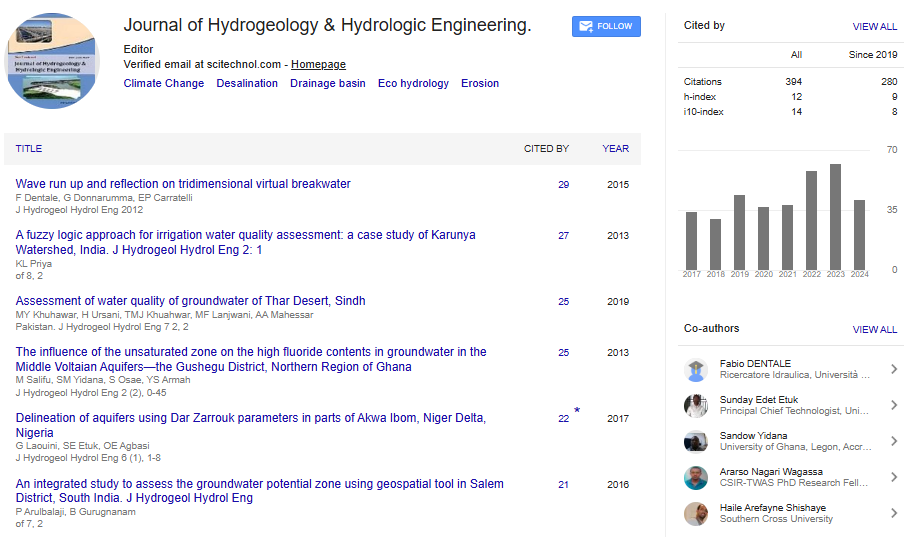Research Article, J Hydrogeol Hydrol Eng Vol: 8 Issue: 3
Hydrochemical Assessment of Groundwater Quality for Drinking, Domestic and Irrigation Purposes in Afigya Kwabre District, Ghana
Victor Ofori Agyemang*
Hydrogeological Unit, Community Water and Sanitation Agency, Cape Coast, Ghana
*Corresponding Author : Victor Ofori Agyemang,
Hydrogeological Unit, Community Water and Sanitation Agency, Cape Coast, Ghana
Tel: +233248136427
E-mail: oforiagyemangvictor@yahoo.com
Received: October 30, 2019; Accepted: November 16, 2019; Published: November 25, 2019
Citation: Agyemang VO (2019) Hydrochemical Assessment of Groundwater Quality for Drinking, Domestic and Irrigation Purposes in Afigya Kwabre District, Ghana. J Hydrogeol Hydrol Eng 8:3.
Abstract
One hundred and twenty (120) groundwater samples were taken from forty (40) boreholes from Afigya Kwabre District of Ghana to study the Hydrochemical characteristics to know the current state of the groundwater quality, the natural processes and anthropogenic activities that affects the groundwater quality as well as the suitability of the groundwater for drinking, domestic and agricultural purposes. The objective was to contribute to and improve the understanding of the hydrochemistry of the groundwater in aquifers in the study area and also to understand the suitability of the groundwater for drinking, domestic and irrigation purposes. Although a lot of works on the groundwater hydrochemistry and quality assessment have been done in Ashanti region of Ghana very little detail work has been conducted with regard to the quality of the groundwater delivered by the aquifers within the Districts on smaller scale. Methods used in this work include groundwater sampling, laboratory analysis of samples, bi-plot techniques which were applied to the groundwater data. The study revealed that the groundwater types in the study area are Na-Cl, Mixed and Na-HCO3. The study also identified silicate weathering, carbonate weathering, mixing processes, ion exchange and anthropogenic activities such as improper waste disposal and application of agrochemicals to influence the groundwater quality in the study area. The groundwater is generally soft and calculation of water quality index for the groundwater showed that 87.5% are suitable for drinking purpose while 12.5% are unsuitable. Low pH, high Fe, F- and Pb are the quality concerns observed in the groundwater. For irrigation use, the groundwater is excellent except high sodium percent of over 60 % in some samples (52.5%).
 Spanish
Spanish  Chinese
Chinese  Russian
Russian  German
German  French
French  Japanese
Japanese  Portuguese
Portuguese  Hindi
Hindi 
